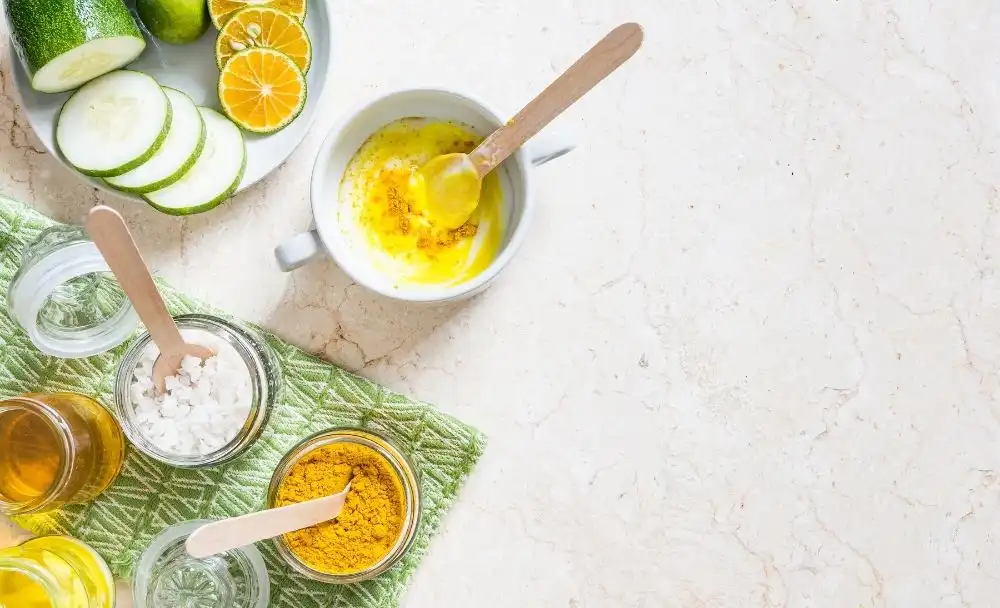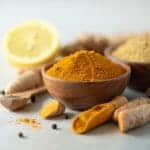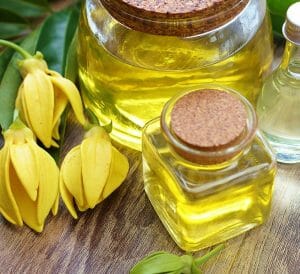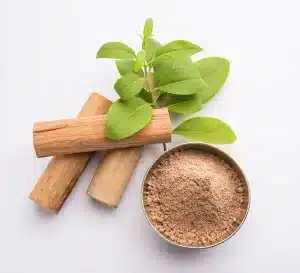This article has been reviewed by experts

Neem, a name familiar since childhood, continues to captivate us with its multifaceted benefits. From leaves to fruits, seeds to bark, neem leaf benefits are found across various domains. As an evergreen tree renowned as the planet’s most potent medicinal asset, it has earned its status as Ayurveda’s gift to nature. Originating primarily in the Indian subcontinent, its value is now acknowledged worldwide, leading to its cultivation beyond borders. Each segment of the neem tree serves a medicinal purpose, contributing to its reputation as a versatile remedy. Delving into the advantages of neem leaf, let’s explore its remarkable features.
Nutritional Value Of Neem
| Components | % per 100 gm |
| Crude Protein | 18.10 |
| Crude Fibre | 15.56 |
| Ether Extract | 2.50 |
| Ash | 5.62 |
| Nitrogen Free Extract | 58.22 |
| Gross Energy (Kcal/gm) | 4.16 |
Properties Of Neem
Due to its potential properties, Neem has been used in Ayurvedic medicine since immemorial. The therapeutic properties of neem is as follows:
- Anti-inflammatory
- Anti-diabetic
- Anti-pyretic
- Anti-carcinogenic
- Anti-microbial
- Anti-dermatic
12 Amazing Benefits of Neem [1] [2] [3]
- Sesame Oil (Til Tail)
Sesame oil is considered a nourishing and warming oil in Ayurveda. It helps improve skin hydration by deeply moisturizing and soothing dry skin. It is commonly used in Abhyanga to promote skin health and prevent dryness.
Scientific support: Research published in the Asian Journal of Beauty & Cosmetology found that sesame seed oil was particularly effective for treating dry skin conditions within 8 weeks (1).
- Haldi Doodh Paste
Haldi or turmeric has anti-inflammatory and antioxidant properties, while milk provides moisture and also contains natural fatty acids. A paste of these ingredients can help alleviate dry skin and improve skin tone.
Scientific support: Milk has proven moisturizing and anti-inflammatory properties that can relieve dry skin symptoms and moisturize the skin, while Haldi reduces inflammation, making it one of the best home remedies for dry skin itching (2,3).
- Amla (Indian Gooseberry)
Amla is rich in vitamin C and antioxidants that promote skin rejuvenation and hydration. Consuming amla or applying amla-based pastes can help nourish the skin.
Scientific support: Studies suggest that amla may help fight dry skin and other skin conditions associated with aging because of its rich composition of bioactive compounds including phenolic acid and antioxidants (4).
- Sandalwood (Chandan)
Sandalwood has a cooling and soothing effect on the skin. Sandalwood paste can help alleviate dryness and irritation while providing a pleasant fragrance. It has been used as standard ingredient in Ayurvedic skincare for centuries due to its skin-calming properties.
Scientific support: Modern studies that have examined the efficacy of Ayurvedic treatment of skin conditions with sandalwood oil have lent support, demonstrating efficacy and safety even when treating paediatric eczema/atopic dermatitis patients – researchers noted a 50% reduction in affected area and symptom severity (5).
- Rose Water (Gulab Jal)
Rose water is known for its cooling and hydrating properties in Ayurveda, making it a common ingredient in skin care products. It can help tone and refresh dry skin when used as a facial mist or in skincare routines.
Scientific support: Rose water is cooling and refreshing on the skin, but it also works to hydrate the skin, with research highlighting its ‘moisturizing and glowing effect’ (6).
- Jojoba Oil
Jojoba oil closely resembles the skin’s natural sebum, making it a lightweight and effective moisturizer that can help balance skin hydration. Jojoba oil has been studied for its use in skincare and is known for its emollient properties.
Scientific support: Jojoba oil has been used for decades as a natural moisturizer in skin care products across the world, with research showing improved hydration and lipid ratio (7).
- Yoghurt
Yoghurt contains probiotics and lactic acid, which can help exfoliate dead skin cells, soothe dryness, and promote a healthier skin barrier.
Scientific support: Although more research is needed, preliminary studies already confirm that probiotics and prebiotics play an important role in skin health and healing, when applied topically (8).
- Almond Oil
Almond oil is perhaps the most commonly used of all home remedies for dry skin in winter. It is rich in vitamins and fatty acids that can moisturize and nourish the skin, relieving dryness and improving skin softness.
Scientific support: As a staple ingredient in natural moisturizers across the world, almond oil has been rigorously studied for its potential skincare benefits. Findings from these studies have shown that the oil has emollient and sclerosant properties, improving skin complexion and tone (9).
- Coconut Oil
Coconut oil contains fatty acids that can help moisturize and replenish the skin’s natural barrier. The ingredient has been a traditional skincare product in India for centuries, especially in the Southern and coastal states.
Scientific support: Many studies, including one published in the International Journal of Dermatology, found that applying coconut oil to dry skin improved hydration and reduced water loss from the skin (10).
- Oatmeal Baths
Oatmeal baths and soaks have long been used as home remedies for dry legs skin or dry skin on the torso. However, as a gentle anti-inflammatory ingredient, it is also regarded as safe for delicate facial skin. Oatmeal’s skincare benefits are mainly linked to compounds called avenanthramides, which have anti-inflammatory and moisturizing effects.
Scientific support: Research published in the Journal of Drugs in Dermatology demonstrated that oatmeal-based products can provide significant clinical improvements in skin dryness, moisturisation and strengthen the skin barrier (11).
- Honey
All of us have come across home remedies for dry skin on the face with honey and with good cause. Honey has natural humectant properties, which means it attracts and retains moisture in the skin. It also has antibacterial properties, protecting dry skin from secondary infections.
Scientific support: Research from the Journal of Cosmetic Dermatology shows that honey-based moisturizers can improve skin hydration and reduce dryness (12).
- Aloe Vera
Aloe vera contains compounds that have anti-inflammatory and soothing properties. It helps to hydrate and calm dry, irritated skin, making it helpful in dealing with a wide range of dry skin conditions.
Scientific support: Researchers in Japan found that aloe sterols can significantly improve skin quality and health as they stimulate the production of collagen and hyaluronic acid in dermal fibroblasts (13).
While these remedies have scientific support for their effectiveness in treating dry skin, it’s essential to remember that individual responses may vary. It’s always a good practice to perform a patch test first. In addition to using these remedies, it’s also crucial to take steps to address dry skin, such as using appropriate moisturizers, avoiding harsh soaps and hot water, staying hydrated, and seeking medical advice if dryness persists or worsens. In some cases, an underlying medical condition may be contributing to dry skin, and addressing that condition may be necessary for effective treatment.
- Skin-related Concerns
Neem’s innate antioxidants contribute to enhancing skin’s radiance and allure. For addressing issues like eczema, itching, rashes, and minor skin problems, a blend of neem leaf paste and turmeric serves as a potent solution. The benefits of consuming neem leaves result in purifying the blood, thus cleansing it and providing radiant skin.
- Ear Ailments Remedy
Neem leaves, when transformed into a paste and combined with honey, offer a soothing answer to ear boils. A few drops of this mixture in the ear can work wonders.
- Wound Healing
Crafting a paste from neem leaves and applying it to cuts or wounds fosters both healing and prevention of infections, a practice to be repeated daily until the wound recovers.
- Eye Health Support
Employing a cooled infusion of boiled neem leaves to cleanse the eyes aids in alleviating redness, irritation, and fatigue.
- Dandruff Management
Banishing dandruff is attainable by boiling neem leaves, letting the water cool, and employing it as a post-shampoo rinse.
- Enhanced Immunity
Merging a handful of neem leaves with a glass of water acts as a magical boost to your immune system.
- Blood Cleansing
Neem’s natural constituents contribute to blood purification, consequently nurturing healthy skin.
- Oral Well-being
Embracing neem oil or powder translates to improved dental health and effective defense against mouth infections.
- Relief from Joint Discomfort
The application of neem oil offers a comforting remedy for joint pain. Neem’s healing properties naturally alleviate arthritis symptoms, reducing joint pain and inflammation.
- Intestinal Worms Eradication
The potential of neem usage extends to assisting in the elimination of intestinal worms. The anti-bacterial properties present in neem aid in killing the worms and providing relief from them.
- Neurological Disorders
Studies show that neem exerts neuroprotective properties in many neurological conditions. Phytochemicals from Neem are beneficial against various neurological disorders such as Alzheimer’s and Parkinson’s.
- Treatment Of Vitiligo
Neem uses also prove to be beneficial for skin problems like vitiligo, an autoimmune disorder that causes the skin to lose colour and turn white.
Uses of Neem [3]
You might have observed individuals in India using neem twigs to cleanse their teeth. These twigs serve as a natural toothbrush, battling germs, averting bacteria, addressing swollen gums, and remarkably brightening teeth. Additionally, they effectively ward off plaque. Neem tree benefits are immense, with each part of the tree helpful in providing relief from many ailments. Neem benefits for skin include providing relief from various skin ailments due to its anti-bacterial and anti-microbial properties.
Utilising Neem Flowers [3]
Within the realm of the neem tree, bitterness prevails throughout its branches. White neem flowers emerge as medicinal assets, with their myriad applications. Possessing a jasmine-like aroma, neem flowers with white buds are harnessed for the treatment of numerous ailments. Their dried, powdered, and fresh forms find use. Neem flowers prove efficacious against indigestion, nausea, and intestinal worms. Neem leaves, on the other hand, offer benefits for the eyes, headaches, and skin.
The Potent Neem Oil [3]
Derived from neem seeds, neem oil is celebrated for its therapeutic prowess. Its applications span hair care, soap production, hand cleansing, and more. Renowned for addressing various skin conditions, neem oil uses for skin have been advocated by Ayurveda. Neem oil can be mixed with coconut oil to create a glowing skin elixir. The advantages of neem oil for hair include getting rid of lice. The antifungal, antibacterial, and anti-inflammatory properties of neem can help in treating scalp issues like dandruff.
Side Effects Of Neem
The therapeutic properties of neem have established it as a renowned medicine in Ayurveda, typically associated with minimal side effects. However, certain studies suggest that neem oil may induce poisoning and vomiting in children. In case you experience any side effects or allergies, it is advisable to consult with your healthcare provider.
Precautions to take with Neem
- Consumption of neem oil or neem bark during pregnancy can increase the risk of miscarriage.
- Prolonged usage of neem may lead to kidney and liver damage.
- Neem has the potential to boost the activity of the immune system, which could exacerbate symptoms in individuals with autoimmune diseases.
Conclusion
Neem advantages are numerous. In the realm of Ayurveda, neem oil is lauded as an exceptional remedy, serving to safeguard other plants. A few drops of neem oil can bestow health to your hair, while also boasting anti-aging attributes. It’s essential to consult a healthcare professional prior to utilizing neem, particularly if pregnancy or underlying medical conditions are factors to consider.
FAQs
Can I use neem oil for dry skin?
Which oils should I avoid for dry skin?
When should I seek medical treatment for dry skin?
Disclaimer: This article is written from a health and lifestyle perspective. It is for general information and not meant to substitute any medical advice. Please consult your doctor for appropriate medical consultation.
References:
- Obikaonu HO. Evaluation of the nutritional value of neem (Azadirachta indica) leaf meal on the performance of finisher broilers. Inter. Journal of Agri. and Rural Dev. 2012;15(3):1235-9.
- Medicinal properties of neem leaves a review, R Subapriya, S Nagini, 2005 Mar;5(2):149-6, doi: 10.2174/1568011053174828.
- Potential benefits of phytochemicals from Azadirachta indica against neurological disorders. Authors: Rajat Sandhir, Mehak Khurana, Nitin Kumar Singhal, Neurochemistry International, Volume 146, June 2021, 105023
- Herbal Remedies of Azadirachta indica and its Medicinal Application. Bhowmik D, Chiranjib YJ, Tripathi KK, Kumar KS. Published 2010, Medicine, Environmental Science, Journal of chemical and pharmaceutical research
- Therapeutics Role of Azadirachta indica (Neem) and Their Active Constituents in Disease Prevention and Treatment, Published online 2016 Mar 1. Mohammad A. Alzohairy
- Induced termination of pregnancy by purified extracts of Azadirachta Indica (Neem): mechanisms involved. G P Talwar, S Shah, S Mukherjee, R Chabra. 1997 Jun;37(6):485-91. doi: 10.1111/j.1600-0897.1997.tb00264.x.
- Neem Leaf (Azadirachta indica A. Juss) Ethanolic Extract on the Liver and Kidney Function of Rats. Irma Seriana. Muslim Akmal, Darusman Darusman, Sri Wahyuni, Khairan Khairan. Published online 2021 Mar 30
- An overview of Neem (Azadirachta indica) and its potential impact on health. Journal Of Functional Foods. Volume 74, November 2020, 104171

























